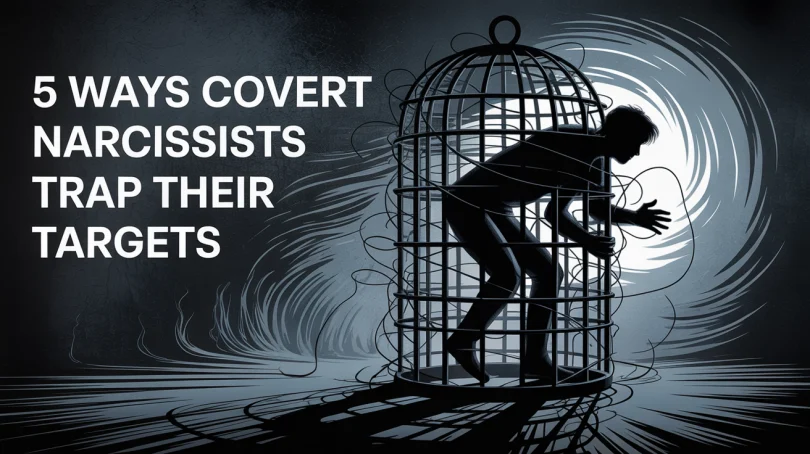How to Spot Covert Manipulation? Covert manipulation doesn’t shout; it whispers. Nothing dramatic is said, and nothing obvious is done, but these tactics are designed to disarm you, influence your choices, shape your reactions, and control outcomes without you ever realizing it. It’s not a misunderstanding, it’s a strategy. But if you know what to look for, you can protect yourself and take your power back.
In this guide, I’ll show you five clues to spot covert manipulation in real time, the red flags most people miss, and how to protect yourself. Let’s start with the kind of manipulation that’s easiest to miss.
Clue 1: Flattery with an Agenda
The first clue is manipulation that sounds like flattery. The words seem kind, but the goal isn’t to praise you, it’s to position you. They start by admiring your resources: your job, your stability, your support system. You might hear things like, “You’re doing so well at work,” or, “You’re always so calm; you must have a solid support system.” At first, it feels like praise, but over time, you’ll notice a pattern. These aren’t compliments; they’re data points.
They’re mapping out what you have that they want access to: money, time, emotional bandwidth, a car, a place to stay, or someone to lean on. Once they’ve identified what’s available, the next phase begins. They reveal quiet vulnerability, but not all at once, just in small pieces.
They’ll say things like, “It’s been a rough couple of months,” or, “I’m doing my best, but it’s hard handling everything alone.” There’s no direct request, just a slow, steady build of emotional weight that suggests you should step in.
Over time, something shifts. It’s no longer just a connection; it feels like a responsibility. They haven’t asked for anything outright, but the implication is clear: you have more, they have less, so you should give. Because you’re a kind, empathetic person, this expectation doesn’t feel manipulative; it feels like morality, decency, or the only right response.
That’s why it’s so effective. There’s nothing to call out, nothing to quote back, but suddenly, you’re giving emotional energy, time, or resources you never consciously agreed to give.
You’re doing it to protect your sense of self as someone good, kind, and caring. By the way, if you’re wondering how to assess the level of risk you’re dealing with, I’ve created a free Narcissist Protection Checklist to help. Grab it in the link below.
Related Topics:
4 Ways narcissists confuse you before they use you
3 Clues to Spot a Malignant Narcissist in Conversation
Clue 2: Subtle Guilt Trips
The second clue appears when you express even a mild limit, like “I can’t” or “I need some space.” They won’t show open anger. Instead, you’ll hear subtle disappointment followed by a reminder of how much they’ve already done for you, not something big or something you asked for, but something they now frame as emotional labor. They might say, “That’s why I washed your car; I know how stressed you’ve been,” or, “I’ve been killing myself to make things easier for you.”
It sounds like a sacrifice, but it’s not; it’s positioning. They place themselves as the giver, so your “no” feels like a betrayal, not because it is, but because they’ve staged the scene that way. This is where it gets confusing. Covert narcissists don’t explode; they lean into the hurt. They look wounded, confused, or softly disappointed. If you see yourself as kind, this hits you right in the gut. You don’t think, “They’re manipulating me.” You think, “I must be selfish. I must not be giving enough.”
But this isn’t reciprocity or care, it’s a setup, a performance of generosity designed to extract something real from you in return. When you feel guilt, it’s not because you did anything wrong; it’s because they’ve carefully manufactured that response in you. Guilt becomes a tool, and you become the one using it on yourself. That’s the cruelty of it, you don’t even realize a boundary has been crossed. There’s no obvious violation, no confrontation, just a quiet, familiar guilt that makes you feel like you’ve let someone down.
What happened? They presented themselves as generous while slowly casting you as the one who’s supposed to carry the weight. Because it was subtle and wrapped in kindness, you assumed the pressure came from within you. That’s not your conscience, that’s manipulation.
Clue 3: The Rewriting of Your Identity
The third clue emerges when they quietly start rewriting who you are. You’re no longer seen as caring, supportive, or generous, you’re positioned as selfish or untrustworthy, the kind of person they warned you about. They don’t say it directly, but the message lands. This isn’t about feeling like you let them down; it’s about being recast as someone unworthy, not through confrontation, but through quiet language that reshapes how they see you and how you start to see yourself.
They might say, “Wow, you only care about yourself,” or, “People start nice, but they eventually show their true colors,” or, “Guess you’re just like everyone else.” Or they’ll go quieter, less direct, but the words still land: selfish, weak, materialistic, sensitive, needy. You don’t walk away feeling attacked, you walk away feeling misunderstood, like they’ve got you all wrong, like they’re seeing you as someone you were never meant to be.
That’s what makes it so painful, especially if you’ve tried to be kind, especially if you care about how you affect people. So, you start trying to fix it, not the situation, but how you’re being seen. You don’t want to be grouped with the “bad people” from their past. Instead of holding a boundary, you start proving who you are, trying to get back to the person they liked, the one who never let them down.
When you hear words like this, it’s a major red flag. These aren’t things someone says because they’re hurt; they’re things said to keep you in your place.
Clue 4: Punishing Your Needs
Clue four happens when you show up as a human being with needs, limits, or exhaustion, and that alone gets framed as a failure. You’re not asking for anything extreme, you’re just sick, overwhelmed, or need some space. Suddenly, you’re treated like a problem.
For example, when someone calls in sick, their manager might say, “You said you could handle this; I trusted you.” Or when a mother says she can’t host the holidays, her mother-in-law might reply, “I didn’t realize I was so unwanted in your home.” Or when a husband takes a few hours to go golfing, he might come home to, “I guess you needed that more than we needed you.”
The request is small. You asked for support, or maybe you just don’t feel like going out, or you’re sad. Instead of care, you get a response that makes you feel like you’ve done something wrong. That’s what creates the confusion. You’ve been supportive, you’ve overgiven, you’ve carried more than your fair share. So, when they respond with coldness or distance, you don’t see it as cruelty; you assume it’s your fault. You must have asked the wrong way, or it was the wrong time.
You start believing you’re too much, that your needs are a burden. So, you try to fix it. You stop asking, you take on more, you perform harder, you do everything in your power not to be a disappointment. You self-censor, you try not to let anyone down, you become hyper-responsible, hypervigilant, emotionally edited. You hide when you’re sick, you overfunction when you’re hurting, you erase your limits just to avoid the feeling that you’ve made someone else uncomfortable.
That loop of trying harder instead of seeing the manipulation is the goal. The confusion isn’t a side effect, it’s the tactic. It keeps you questioning yourself instead of seeing what’s being done to you.
Clue 5: Withdrawing Approval
Clue five occurs when you’re still giving, but not as much as they want, even though you feel exhausted, overworked, and stretched thin. Something in the conversation shifts, they treat you like you went off script, and now you’re being pulled back into the role they want you to play by chasing their approval.
They’ll say something like, “I’m fine,” or, “You do you,” or, “I guess I misread who you are.” It sounds casual, but it lands painfully. The tone shifts, the approval is gone, and the version of them that seemed receptive or kind is replaced with something colder. You don’t know exactly what you did, but you know you’re no longer in good standing.
By this point, the clearest sign of manipulation might not be what they say, it’s how you respond. You start working to get their approval back. You explain, you soften your tone, you make sure you don’t come off too strong next time. You stop asking for things, you manage their mood, you try to stay in that version of them that feels safe, open, and connected.
This is exactly what they want: more time, more emotional energy, more care, more attention. They want you to pour your resources into them, even when nothing is offered back. Their withdrawal is strategic, it keeps you trying, overexplaining, and overgiving. They don’t have to ask for more directly; they just make you work hard to get back in their good graces.
While you’re focused on fixing the mood, you’re handing over exactly what they’re looking for. The more you care, the more you edit yourself. You become agreeable, accommodating, and easier to love. You train yourself to avoid anything that might trigger the next freeze-out, not because they’ve told you to, but because you’ve learned how their game works.
Spotting covert manipulation requires recognizing these subtle patterns: flattery with an agenda, guilt trips, rewriting your identity, punishing your needs, and withdrawing approval. By understanding these clues, you can protect yourself and reclaim your power.







Leave a Comment